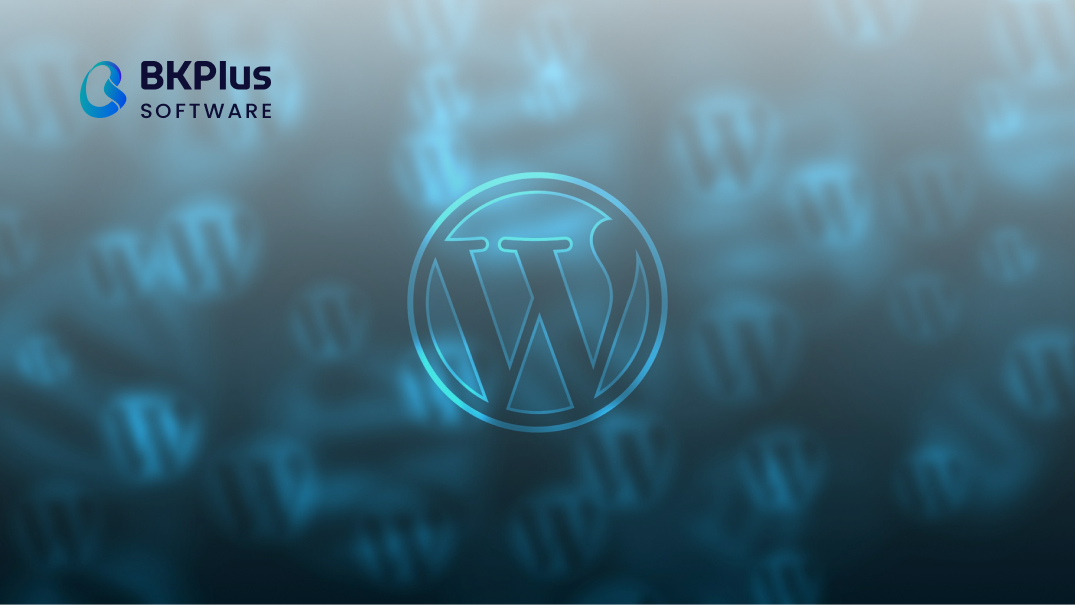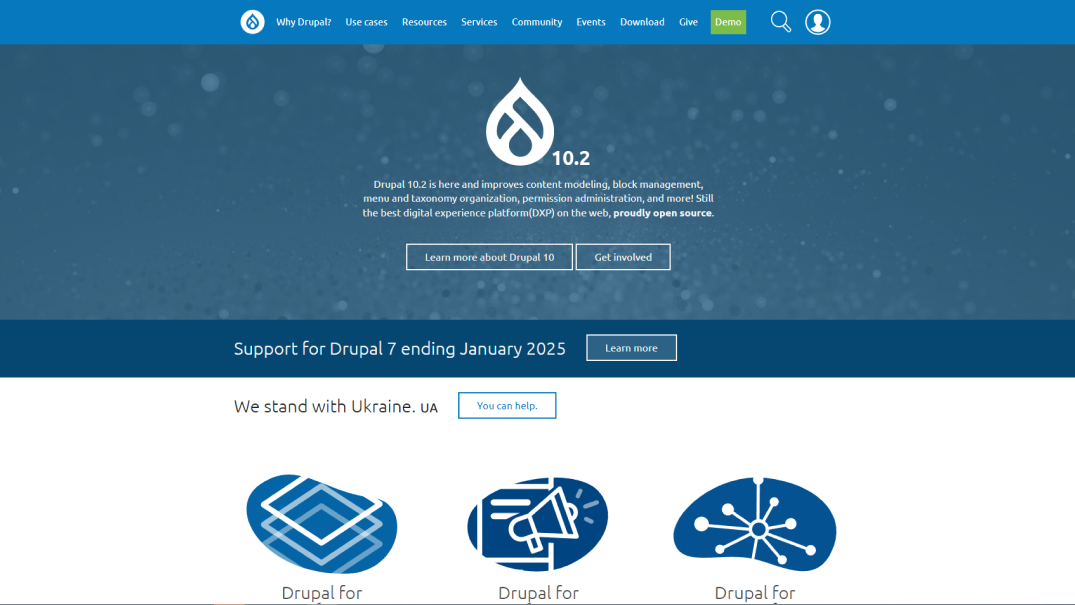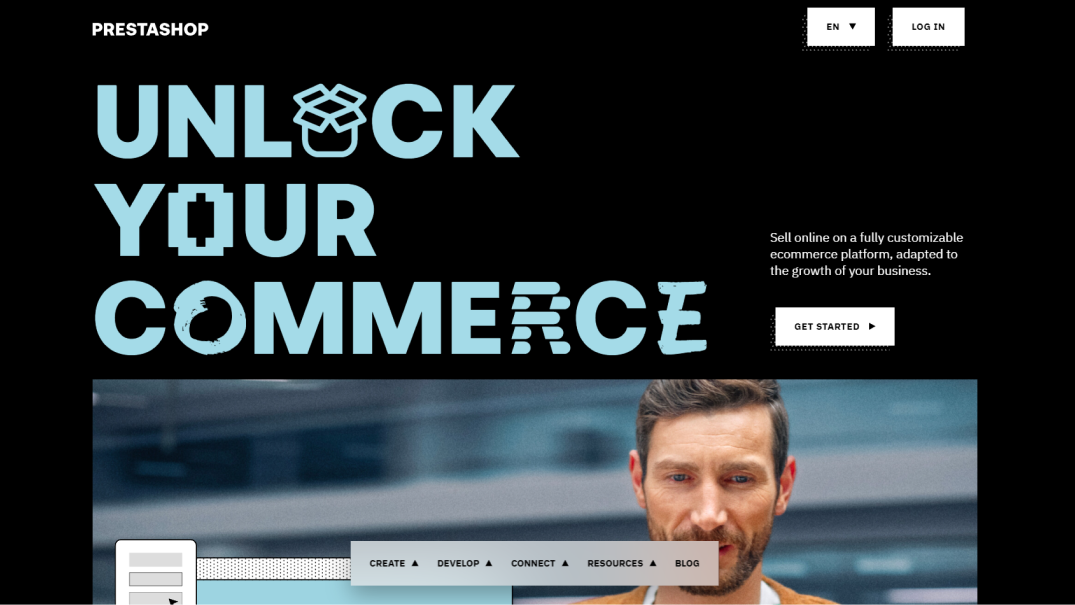Using the right content management system (CMS) is crucial for building and managing a successful website. More than 73 million websites benefit from CMSs, which enable easy content management and website creation without coding knowledge.
With around 1,000 to 2,000 CMS solutions available in the market, finding the one that suits your needs can be daunting. Key factors to consider include the platform’s user-friendliness, customization capabilities, security measures, SEO tools, and the availability of a supportive community.
This article will guide you through 15 of the best CMS platforms, including WordPress, Joomla, and Drupal. We’ll focus on what makes each CMS stand out to help you decide.
What Is a CMS?
A CMS platform (content management system platform) is software that allows you to easily manage content and create a website.
Normally, websites are written in the programming languages HTML, JavaScript and CSS. If you were to build a website without a CMS platform, you would have to learn these languages and write a lot of code.
CMS platforms solve this problem by allowing you to create a website without writing code or learning programming. Unless you’re looking for a developer-friendly CMS, which means you already know how to code.
7 Best CMS Software Solutions
1. WordPress

Over 43.2% of all websites use WordPress, making it the most popular CMS platform. WordPress is an open-source software known for its flexibility and scalability. Moreover, its gallery of over 58,000 WordPress plugins helps users create any type of website.
Pros:
– The cost is flexible to individual needs and budgets.
– Customize using an extensive gallery of free WordPress themes and great plugins.
Cons:
– Not all WordPress plugins and themes are reliable or of high quality.
– Lacks personal customer support. Instead, it relies primarily on forums, tutorials, and documentation.
Best for:
WordPress can work for all levels of users, from those who wish to start a simple blog to those creating a complex site. A notable example of a WordPress site is Sony Music, which displays images and videos of its featured artists.
Key Features:
– User management. Assign roles and access to different user types: administrators, editors, authors, contributors, and subscribers.
– Media management. Include alt text and captions when inserting images to improve SEO.
– Built-in comments. Allow visitors to comment on pages and posts.
2. Joomla

Joomla is an open-source CMS that powers over 2% of all websites. Compared to other CMS platforms, its core software offers more functionality right away, such as its multilingual features. However, the initial setup of Joomla can be challenging for non-technical users.
Pros:
– Manage a site with hundreds of sub-pages efficiently.
– Use 2-factor authentication to avoid break-ins.
Cons:
– Web development terminology featured in the control panel is not beginner-friendly.
– Lack of compatibility between different modules, extensions, and plugins.
Best for:
Joomla is best for professional websites managed by multiple people. Take the official website of the international tennis player Roger Federer as an example. This website displays not only his portfolio but also a news platform and a shop.
Key Features:
– Banner management tool. Create advertising campaigns to monetize the website.
– Multilingual setting. There are more than 70 languages available for the websites using the platform’s core software.
– Search. Help visitors find the appropriate information on a site using a built-in search tool or smart search feature.
3. Drupal

Designed for professional web developers, its flexible API architecture supports different digital platforms. Compared to Joomla and WordPress, Drupal optimizes its built-in features for better performance and security. It’s also worth noting that Drupal’s websites get higher web traffic than other CMS software.
Pros:
– Less vulnerable to security threats as the CMS software conducts security tests regularly.
– Built-in modules help to expand the functionality of a site.
Cons:
– Requires coding knowledge of PHP, CSS, and HTML.
– Managing Drupal, such as upgrading to a new version, can be time-consuming.
Best for:
A good CMS platform for advanced users with great technical knowledge to create large-scale and complex sites. For example, the official website of the City of Los Angeles uses Drupal to give updates and information about the city.
Key Features:
– Multilingual. Automated language translation supports over 100 languages.
– Personalization. Create a personalized customer experience using data from geolocation, browser history, device type, and behavior taxonomies.
– Marketing automation. Create automated marketing campaigns to increase reach.
4. Magento

Magento is one of the best eCommerce platforms out there. The CMS software focuses on security, SEO, and customization to optimize all types of eCommerce sites. As it caters to bigger online stores, the platform is powerful enough to feature a high number of products and orders.
Pros:
– Manage multiple stores in various locations, using different languages and currencies.
– Content management is responsive to mobile devices.
Cons:
– Complicated initial setup.
– Customizing design and listing products is time-consuming.
Best for:
Magento is great for medium to large-scale eCommerce stores. One example of a large eCommerce store using Magento is Olympus, which sells cameras, audio equipment, and binoculars.
Key Features:
– Checkout. Secure payment gateway using Worldpay and Cybersource.
– Touch-friendly features. The back-end admin dashboard is touch-sensitive, making it easier to make edits.
– Catalog management. Showcase products virtually using inventory management, including immediate product creation and dynamic pricing.
5. PrestaShop

PrestaShop is another popular CMS platform for small to medium-sized eCommerce businesses. Its active community and broad set of features make it a highly flexible online store management platform. Its comprehensive interface also helps to enter and monitor products easily.
Pros:
– Access to user-friendly eCommerce features for users of all skill levels to create a professional online store.
– There is a broad selection of themes and modules for customization.
Cons:
– Lack of scalability to grow into a bigger eCommerce store.
– Relies on extensions and plugins, which can be costly.
Best for:
PrestaShop is an excellent platform for small to medium-sized eCommerce businesses. For example, Harry Fay, a niche jewelry store in the United Kingdom, sells different rings and wedding bands online.
Key Features:
– SEO. Manage meta titles, descriptions, and URLs to optimize content.
– Payment options. Large selection of payment getaways, including PayPal, Skrill, Stripe, WorldPay, and offline processing.
– Multiple store management. Manage multiple stores that share common components and features.
6. HubSpot CMS

HubSpot CMS is one of the top CMS options for creating a website without the need for constant updates and edits. It’s perfect for beginners as well since this platform’s user-friendly tools can help publish a website without technical knowledge. Its great integrated sales and marketing tools also help to increase reach and engagement.
Pros:
– Increase engagement using email and social media tools.
– Provide a dedicated team to monitor the platform 24/7 to check for attacks and handle regular virus scans.
Cons:
– Limited gallery for plugins and themes.
– No direct technical support.
Best for:
The HubSpot CMS is a top choice for marketers and basic websites. One of the examples of a website using this CMS software is Stellar Recruitment, which constantly posts job vacancies.
Key Features:
– Smart Content. Personalize content and call-to-actions on the site by using insights and information on the visitors.
– Design manager tool. A user-friendly drag-and-drop tool to make customization easier.
– SEO. Optimize content by following the integrated SEO recommendations.
7. Kentico

Kentico is another headless CMS – a cloud-based content management software that uses an API. The platform can deliver content efficiently on different digital platforms. In addition, its great marketing tools help to reach more audiences and engage with visitors.
Pros:
– Easy to enhance digital strategy, including content management, eCommerce, and online marketing tools.
– Implement the latest security protocols and data backup features.
Cons:
– The cost is higher than other CMS platforms.
– Requires technical knowledge to grow a site.
Best for:
Great for businesses building a large site that needs multi-functionality. An example of a large business site using Kentico is Skype. The website lists its products as well as regular blog updates.
Key Features:
– Built-in spell check. Catch the typos on all websites.
– Scheduling. Regularly schedule tasks, including running nightly summary reports and data syncing.
– Lead scoring. Get an insight into visitors’ journey and behavior.
Conclusion
In short, a CMS helps you manage your content and turn it into a website without having to edit code every time you want to add or change content.
Some of these tools are almost exclusively focused on helping you create a website, while others are more focused on managing your content and letting you deploy it anywhere via APIs. If you are not a technical user (or don’t have a technical team behind you), you’ll probably choose tools like WordPress, Drupal, or HubSpot CMS.
However, if you need to deliver your content to multiple sites, you may prefer the flexibility of a headless CMS if you have the technical skills to use one.
BKPlus Software is a Vietnamese website design, software development, and IT outsourcing company. Our team specializes in providing high-quality ReactJS, VueJS, Python, Golang, e-commerce, Node, Flutter, and mobile app development services. Contact us to discuss how we can help leverage your technology for business growth.



